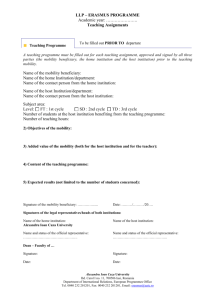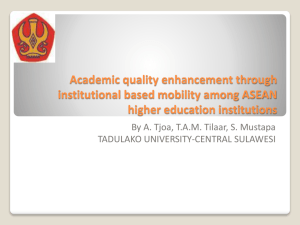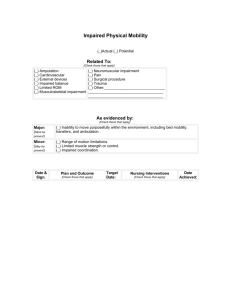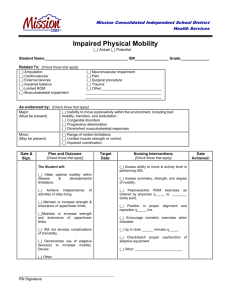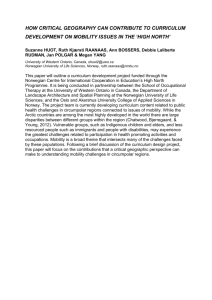Erasmus+ Capacity Building in Higher Education (CBHE)
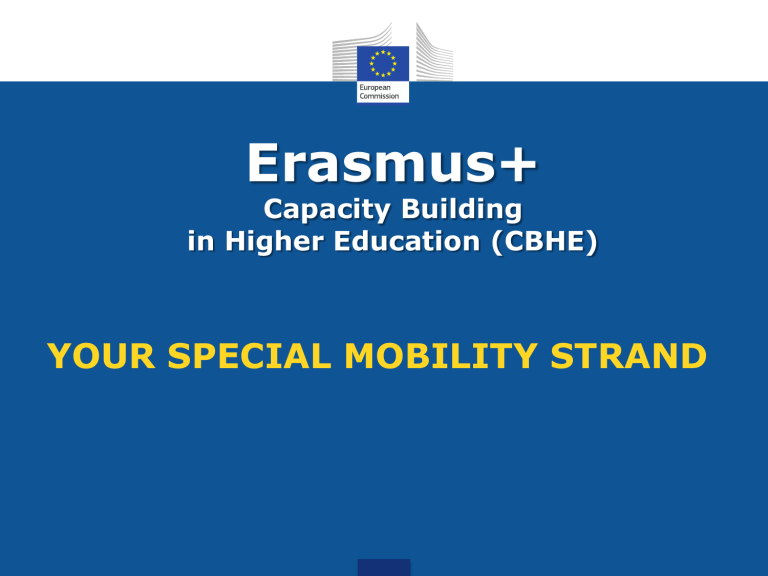
Erasmus+
Capacity Building in Higher Education (CBHE)
YOUR SPECIAL MOBILITY STRAND
Presentation outlines
A. Special Mobility Strand(SMS): definition and eligible activities/participants
B. Individual mobility scheme:
• Preparation
• Implementation
• Follow-up
C. Financial Management
D. EACEA Mobility Tool
A. Special Mobility Strand (SMS): what is it?
• Additional support to the selected CBHE to support international mobility of student and staff
• Mobility for studying, training and teaching purposes that must be instrumental to the objectives of the CBHE
Implementation Framework!!!
A. Who can benefit? The students
• Must be registered in a Higher Education Institution (HEI) involved in the selected CBHE Project.
• Students must be enrolled at least in the second year of
higher education studies (for study mobility)
Activities
From Partner C
To Partner C
Study
Traineeship
X
X
From Partner C
To Programme C
From Programme C
To Partner C
From Programme C
To Programme C
X
X
X
X
Not eligible
Not eligible
A. Eligible activities for students
Purpose Duration
Receiving
Organisation
Type of activities/targets
Studying
Traineeship
Min. 3 months (or 1 academic term) –
Max 12 months
including a complementary traineeship period, if planned
2-12 months
Beneficiary HEI
Any relevant place
(beneficiary or not) in a country involved in the consortium
The same student may participate in mobility periods totalling up to 12 months maximum per cycle of study, independently of the number and type of mobility activities:
during the first study cycle (Bachelor or equivalent) including the short-cycle (EQF levels 5 and 6);
during the second study cycle (Master or equivalent - EQF level 7); and during the third cycle as doctoral candidate
(doctoral level or EQF level 8).
[1]
[2]
Prior experience under E+Key Action1 - Credit Mobility, LLP-Erasmus Programme and the Erasmus Mundus Programme counts towards the 12 months per study cycle.
In one-cycle study programmes, such as Medicine, students can be mobile for up to 24 months.
A. Who can benefit? The staff
HEI staff members (teaching and non-teaching) and staff members from any participating organisation are eligible to participate in the
SMS mobility.
Activities Staff from beneficiary
HEIs
Staff from no HEI beneficiaries
From PC
To PC
From PC
To PgC
From PgC
To PC
From PgC
To PgC
Teaching X X X X X Not eligible
Training X Not eligible X X Not eligible Not eligible
A. Eligible activities for staff
Purpose Duration
Receiving
Organisation
Type of activities/targets
Teaching
Training
5 days to 2 months
excluding travel time
min 8 hours per week
(or any lower period).For
incomplete week must be proportional
Beneficiary HEI
Beneficiary
HEI or any relevant organisation in a country involved in the consortium.
Destination has to be different from the home country.
HEI teaching staff or staff from enterprises to teach at a beneficiary HEI.
Support of the professional development of HEI teaching & non-teaching staff: a) participation in structured courses, including professionally focused language trainings, or training events abroad (conferences excluded); b) job shadowing/observation periods/trainings at a beneficiary HEI, or at another relevant organisation abroad.
B. Main phases of the mobility scheme preparation implementation follow-up
B. Preparation: Basic Principles
• Abide by the principles of E+Charter
• Relevant information on selection process and admission and selection criteria must be available to candidates well in advance
• Associate partners cannot benefit from the SMS
B. Preparation: compulsory documents
To be signed by:
Inter-institutional agreement
(General Framework)
Individual Grant Agreement
(Duration & Financial Support)
• Each Organisation in the consortium
(before starting the selection of the mobility scheme)
Learning and Mobility
Agreement
(Content & Credits/L.
Outcomes)
• The Individual, the
Sending and the receiving organisation
(before the start of
the individ. mobility)
B.
Preparation: Inter-institutional Agreement
• Signed by each beneficiary's organisation before the selection of the mobility scheme (collective or bilateral)
• Provides specific provisions on the roles of the organisations, selection procedure, admission/selection criteria, appeal procedures, decision making process, quality assurance measures…
• Template available on the CBHE beneficiary space: minimum requirements must be maintened but new provisions can be added.
B. Preparation: Define tasks
Inter-institutional Agreement (IIA)
Sending Organisation Receiving Organisation
• Promote and raise awarness • Inform locally
• Select the candidates in line with IIA
• Prepare logistics and support for incoming individuals
• Provide support in preparation of the individual mobility (visa, administrative question, insurance etc)
• Welcome and monitor the activities
B. Preparation:
Individual Grant Agreement
Grant agreement contains specific provisions related to:
• the duration of the scholarship,
• the financial support that the students will receive,
• the payment arrangements,
• the insurance requirements during the mobility
• Participants' report
• other general conditions
B. Preparation: Individual Grant Agreement
Grant agreement + for students
Learning Agreement for studies
Learning Agreement for traineeship
Mobility Agreement for teaching
Grant agreement + for staff
Mobility Agreement for training
B. Preparation: Learning/Mobility Agreement
Grant agreement for students
Learning Agreement for
Grant agreement for staff
Mobility Agreement for
Studies Traineeship Teaching Training
• List of courses with ECTS (or equivalent)
• targeted learning outcomes
• formal recognition
• knowledge skills • overall objectives
• competences expected to be acquired
•
• activities and added value foreseen expected outcomes and impact
• (compulsory/ voluntary?any
ECTS?)
Learning Agreement and Mobility Agreement must be: agreed and signed by the individual, the sending and the receving organisations
BEFORE departure
B. Implementation: basic principles
• Pre-financing of the grant must be foreseen for students in order to facilitate the installation process.
• Receiving organisation and sending organisation have to ensure a constant follow-up and regular monitoring on the individual mobility.
• All mobility details must be encoded in the EACEA
Mobility tool
B. Follow-up: basic principles
Beneficiary organisations involved in the SMS commit to:
• Recognise the ECTS or equivalent credits obtained by the students during the activities carried out and agreed in the
Learning Agreement
• Avoid any extension of the study period upon return to take additional exams
• Recognise, disseminate and embed the learning outcomes of the staff mobility (for training purposes)
• Solicit the individuals to fill in the Participant Report before the end of mobility (for students) and right after the end of the mobility (for staff).
C. Financial Management
C. Financial Management: basic principles
• The budgets of your CBHE and SMS must be kept separated
• It is a contribution to cover two types of costs (based on
the principle of unit costs): Subsistence costs and travel
• Individuals cannot benefit at the same time from SMS support and E+International Credit Mobility
• Students selected must be exempted from paying fees for tuition, registration, examinations and access to laboratory and library facilities at the receiving institution.
C.
Subsistence costs for students
RECEIVING COUNTRIES
Denmark, Ireland, France, Italy, Austria, Finland, Sweden,
United Kingdom, Liechtenstein, Norway
Belgium, Czech Republic, Germany, Greece, Spain, Croatia,
Cyprus, Luxembourg, Netherlands, Portugal, Slovenia,
Iceland, Turkey
Bulgaria, Estonia, Latvia, Lithuania, Hungary, Malta, Poland,
Romania, Slovakia, former Yugoslav Republic of Macedonia
Albania, Bosnia and Herzegovina, Montenegro, Serbia and
Kosovo
Armenia, Azerbaijan, Belarus, Georgia, Moldova, Territory of
Ukraine as recognised by international law, Algeria, Egypt,
Israel, Jordan, Lebanon, Libya, Morocco, Palestine, Syria,
Tunisia
All other Partner Countries
Students from Partner
Countries
Amount (per month)
Students from Programme
Countries
Amount (per month)
850€
800€
750€
750€
Not eligible
Not eligible
Not eligible
Not eligible
650€
Not eligible
C.
Subsistence costs for students
• The amount must be paid in full and directly to the student concerned.
• Consortia are strongly recommended to manage their SMS grants in an account in euros.
C.
Subsistence costs for staff
RECEIVING COUNTRIES
Denmark, Ireland, Netherlands, Sweden, United
Kingdom
Belgium, Bulgaria, Czech Republic, Greece, France,
Italy, Cyprus, Luxembourg, Hungary, Austria, Poland,
Romania, Finland, Iceland, Liechtenstein, Norway,
Turkey
Germany, Spain, Latvia, Malta, Portugal, Slovakia, former Yugoslav Republic of Macedonia
Estonia, Croatia, Lithuania, Slovenia
Albania, Bosnia and Herzegovina, Montenegro, Serbia and Kosovo
Armenia, Azerbaijan, Belarus, Georgia, Moldova,
Territory of Ukraine as recognised by international law
Algeria, Egypt, Israel, Jordan, Lebanon, Libya,
Morocco, Palestine, Syria, Tunisia
All other Partner Countries
Staff from Partner Countries
Amount (per day) up to the 14 th day between the
15 th & 60 th day
Staff from Programme
Countries
Amount (per day) up to the 14 th day between the
15 th & 60 th day
160€ 112€ Not eligible
140€
120€
100€
100€
Not eligible
98€
84€
70€
70€ 160€
Not eligible
Not eligible
Not eligible
Not eligible
112€
C. Subsistence costs for staff
Beneficiary organisation in accordance with their institutional practice can decide to either :
• provide the amount directly to the staff members concerned or
• provide the participant with direct provision of the required services (i.e. payment of the hotel, subsistence, local transportation, personal or optional health insurance).
C. Travel Costs for students and staff
Distance Band
For travel distances between 100 and 499 KM
For travel distances between 500 and 1999 KM
For travel distances between 2000 and 2999 KM
For travel distances between 3000 and 3999 KM
For travel distances between 4000 and 7999 KM
For travel distances of 8000 KM or more
Amount per participant (return trip)
180 EUR
275 EUR
360 EUR
530 EUR
820 EUR
1100 EUR
C. Travel Costs for students and staff
Consortia can either provide:
• directly to the participant the unit costs corresponding to the appropriate distance band or
• provide the participant with travel support in the form of direct provision of the required travel support services.
Institutions shall ensure that the provision of services will meet the necessary quality and safety standards.
C.
Modification of the mobility scheme
Regardless of the duration, the minimum number of:
• students from Partner Countries and Programme Countries
• staff members from Partner Countries and Programme
Countries
As foreseen in the original proposals must be respected!
These figures and the budget allocation for each of the 4 categories are indicated in the Estimated Budget of the Action,
Annex III of the CBHE Grant Agreement signed with the Agency.
C.
Modification of the mobility scheme
Modification to Annex III of the CBHE Grant Agreement (GA) can take place provided that:
• it does not affect the minimum number of mobilities foreseen,
• the change in the amount of the budget indicated in the GA for one or more of the mobility categories does not exceed 10
%, and
• the total estimated budget indicated in the GA is not exceeded.
Example 1 Student mobility
Purpose: studying Master level (EQF/ISCED 6) and traineeship
Mob track: from University of Cairo to the University of
Rome (2130.34 km)
Start date: 21/09/2017
End date: 28/03/2018
Duration: 6 months 8 days
Sub. costs: (6 months x 850€) + (850€: 30dd) x 8dd = 5.326,7€
Travel: 360€
Total grant: 5686,7€
Example 2 Staff mobility
Purpose: teaching
Mob track: from the University of Yerevan to the University of Antwerp (3298.36 km)
Start date: 06/10/2016
End date: 25/10/2016
Duration: 20 days
Sub. costs: (140€ x 14dd) + (98€ x 6dd) =
1.960€ + 588€ = 2.548€
Travel: 530€
Total grant: 3.078€
Documents inventory
Inter-Institutional Agreement
Grant Agreement (GA) for students mobility
Learning Agreement for studies
+ Guidelines on how to use the Learning Agreement for studies
GA Annex
Learning Agreement for traineeships
+ Guidelines on how to use the Learning Agreement for traineeships
Grant Agreement (GA) for staff mobility
Mobility Agreement for teaching
GA Annex
Mobility Agreement for training
Participant EU survey
Erasmus+ Student Charter
EACEA Mobility Tool
• S
UPPORT to the coordinators in the management of the individual mobility
• T
RANSCRIPTION OF INFORMATION on mobility tracks, activities, credits earned, amounts disbursed and automatic reports.
coordinators must update the tool regularly
To ease the management
For statistical analysis and quantitative assessments

